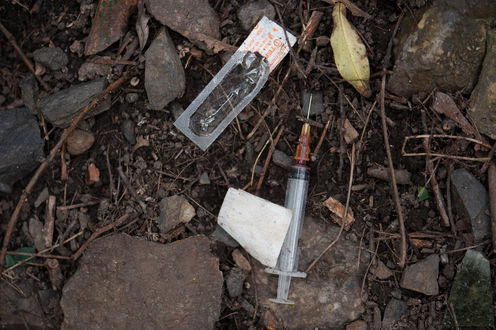
In 2012, 103,000 people around the world lost their lives to drug poisoning or overdose. As terrible as this waste of life seems, it’s important to remember that drug overdoses are not inevitably fatal.
An overdose is when there’s too much of a drug (or combination of drugs) in the body for it to cope. You can overdose from illicit substances, such as heroin, or prescription medications, such as valium or opioid painkillers.
Overdose deaths in Australia claim an extraordinary number of lives; in 2012, fatal overdoses outnumbered road deaths for the second year in a row (1,427 overdoses to 1,338 road deaths). Such deaths are more likely in regional and rural areas than in capital cities. Perth has the highest rate of all capital cities, followed by Adelaide, Brisbane, Sydney and Melbourne.
Overdoses are not just something that happens to young drug users. Australian Bureau of Statistics data provided to the Penington Institute (not available online at the time of publication) shows the number of middle-aged women dying from accidental overdose has more than doubled in a decade. Indeed, women aged between 30 and 50 are now almost four times more likely to die of an unintended overdose than in a car accident.
Heroin used to be the main cause of overdose during the late 1990s, but by 2007–08 prescription opioids accounted for 80% of the overdose cases admitted to hospital.
In Victoria, for instance, coroner’s reports show pharmaceutical drugs have become increasingly common in fatal overdose. This year, the Victorian Coroners Prevention Unit noted in a report to the Coroners Court that pharmaceutical drugs played a causal or contributing role in around 80% of Victorian overdose deaths between 2012 and 2013, whereas illegal drugs played a part in around 40%.
The fact that pharmaceuticals could be causing more overdose deaths than illegal substances means that it’s possible for any one of us to encounter someone having an overdose, so here are three things you should know about drug overdoses.
1. Giving up drugs can increase risk of overdose
When someone uses a drug regularly, they develop tolerance to it. This means they need to use more to get the same effect.
But if someone hasn’t been using regularly for whatever reason, including not being able to get drugs, their tolerance will drop. When people take drugs after a break from using, the amount they take could be too much for the body to cope with and lead to an overdose.
Substantial evidence from a number of longitudinal studies indicates that the period immediately following release from prison and the period immediately following discharge from an abstinence-based rehabilitation facility pose a significantly elevated risk of overdose.
2. Snoring can be a sign of overdose
People often die from overdoses after family and friends notice them snoring loudly and leave them to “sleep it off”. The unusual snoring noise characteristic of an overdose results from a reduction in the size of the airway and in the volume of air able to move in and out of the lungs with each breath.
Heroin and pharmaceutical opioids are depressants, so they relax the bodily processes. This means an overdose will cause breathing to slow. Left untreated, the brain struggles to function because of lack of oxygen, blood pressure decreases and the heart rate slows, ultimately leading to cardiac arrest.
For people who are substance users, snoring is not normal. Rather, it may be a sign of a significant and life-threatening emergency – try to wake the person immediately.
Other signs of an opioid overdose are:
- blue lips or fingertips
- floppy arms and legs
- no response to stimulus
- disorientation and
- unrousable (can’t be woken up) unconsciousness.
3. It can take hours to die from an opioid overdose
Early reports of the death of Philip Seymour Hoffman had a police official saying it was clear the acclaimed actor died of an overdose because he had a needle in his arm. A statement like this can be a little misleading because an overdose from opioids does not cause the user to fall dead on the spot as they suggest.
An overdose death can occur within minutes, but it often takes hours. This leaves a large window of opportunity during which a range of measures can be taken to save that person’s life.
Calling an ambulance is the best thing you can do. Paramedics will have a drug called naloxone, which is a rapidly acting antagonist to heroin and related drugs. It is saving many lives that could be lost to overdose.
David Penington is a Patron of the Penington Institute, an institution committed to evidence based harm reduction as part of illicit drug policy.
Steve Wesselingh does not work for, consult to, own shares in or receive funding from any company or organisation that would benefit from this article, and has no relevant affiliations.
